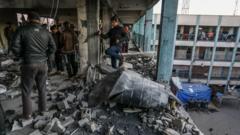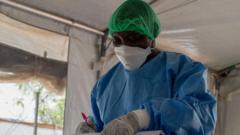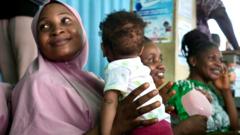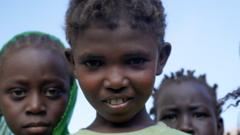A notable decline in mpox cases has been observed in the Democratic Republic of Congo since vaccination began, with medical professionals reporting only a few new cases daily. However, experts caution that while there is progress, the outbreak is not yet under control, particularly for unvaccinated children.
Mpox Cases in Democratic Republic of Congo Show Signs of Stabilization Amid Vaccination Efforts
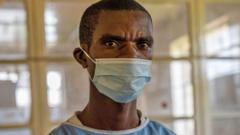
Mpox Cases in Democratic Republic of Congo Show Signs of Stabilization Amid Vaccination Efforts
Following the rollout of vaccinations, health officials report a decrease in new mpox infections in DR Congo, though challenges remain, particularly concerning children's vaccinations.
Medics working in the thick of the mpox outbreak in the Democratic Republic of Congo (DR Congo) are reporting a welcome decline in new infections. Following the initial rollout of vaccinations last month, the Lwiro clinic, situated in eastern DR Congo, has seen a drop in daily mpox cases from approximately 10 to 15 to just two or three, according to nurse Jackson Murhula. The World Health Organization (WHO) has also indicated that the number of new mpox cases may be plateauing, though they emphasize that it's too early to draw definitive conclusions about the impact of the vaccinations.
Mpox, previously known as monkeypox, has been linked to numerous fatalities, with reports suggesting that at least 900 people have died from the disease in DR Congo this year. The high fatality rate has led the WHO to call for urgent discussions around the outbreak's status as a global public health emergency, especially with 19 African countries currently reporting cases.
During a recent visit to Lwiro, the community hospital’s situation showcased a significant improvement compared to two months prior, when facilities were overwhelmed with patients. Nurse Emmanuel Fikiri expressed optimism as vaccination efforts have gained traction, with over 50,000 individuals already vaccinated out of the 265,000 doses received from international partners.
Challenges persist, particularly concerning the higher rates of infection among children, with some experts estimating that children account for about 30% of cases. The WHO recently authorized a new vaccine specifically for children. As neighboring African nations also begin to implement their own vaccination campaigns, health officials continue to stress the importance of vigilance.
Despite the positive trends, the medical community urges caution. Both Nurse Murhula and Dr. Samuel Boland, WHO's incident manager for mpox, warn that while the situation has stabilized considerably, it cannot yet be declared under control. Dr. Boland noted that more than 96% of new cases globally are still occurring in DR Congo, Uganda, and Rwanda, underlining the need for continued intervention and vaccination efforts.
As health officials analyze data to gauge the outbreak's trajectory, communities are urged to remain proactive in seeking treatment and vaccinations to mitigate further spread and protect vulnerable populations, especially children. The outlook for the coming months is cautiously optimistic, with hopes that the ongoing efforts may significantly reduce cases and fatalities.






